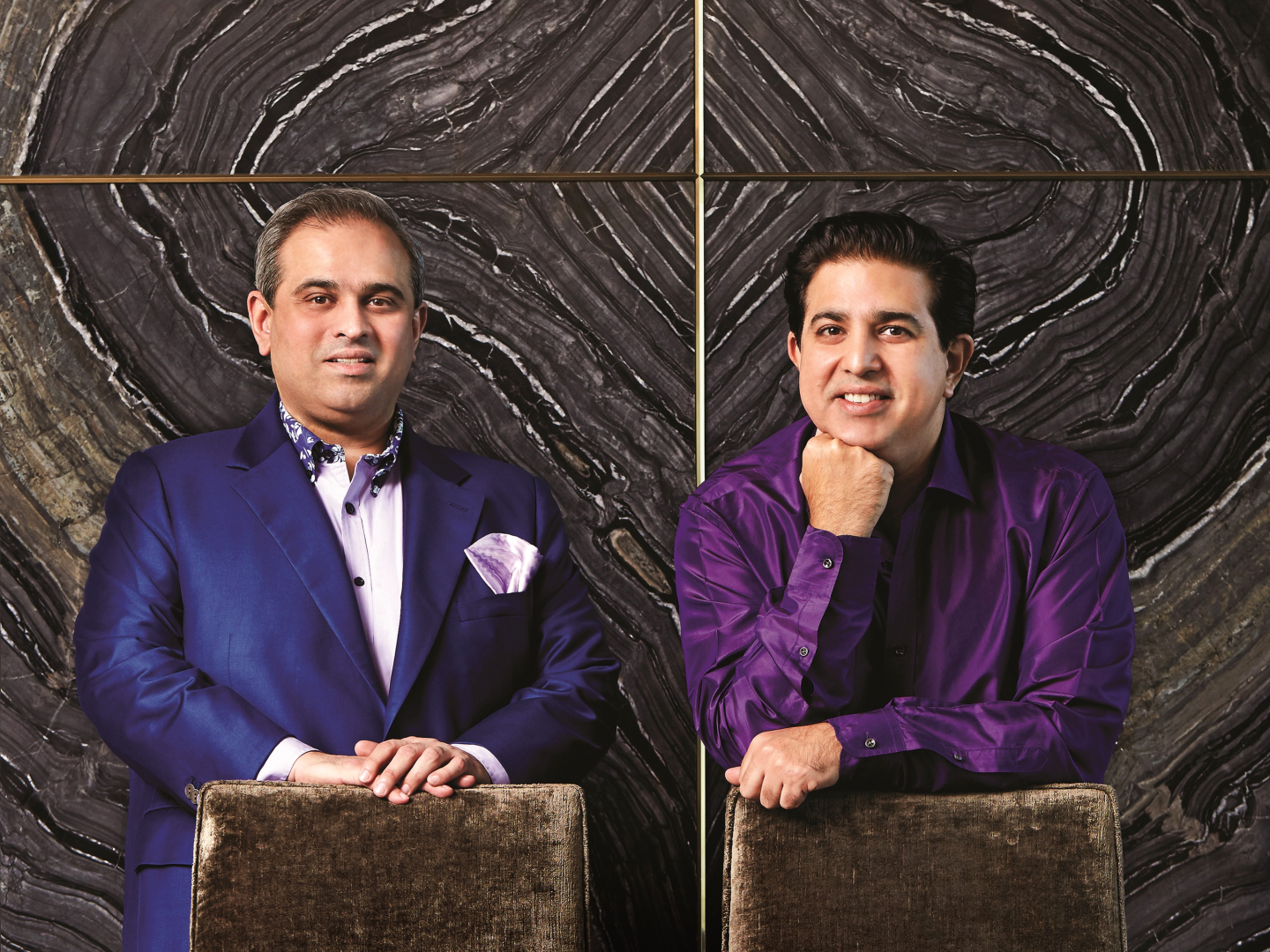
Sharan (left) and Ashvin Valiram (Photo: Soophye)
The last time Options met Ashvin Valiram for a formal interview was in 2016. Swiss Watch, the multi-brand watch emporium owned by luxury retailer Valiram, was celebrating its 15th anniversary and after meeting at its Pavilion Kuala Lumpur boutique, we adjourned to TWG Tea for a drink, snack and a chat over the lavish plans for that year’s Art of Time watch fair.
Five years later, we are revisiting the Valiram family’s colourful story of enterprise and entrepreneurship under vastly different circumstances — what was once Kuala Lumpur’s vibrant retail scene has been silenced by the impact of the Covid-19 pandemic. As it reawakens, we are slowly seeing which businesses have survived this Darwinian adapt-or-die test, and which have not. Swiss Watch’s 20th anniversary is therefore hard-won indeed, and most deserving of the Art of Time exhibition that ran at Pavilion KL until Oct 31.
Even though restrictions have been lifted and malls are fully open, we opt to meet this time at the Valiram brothers’ personal residence. It is a nice change of pace, and also reveals a side of the brothers that you don’t get to see at the office or in their stores. Sharan the conscientious host (he is organising tea) and Ashvin the doting father (we overhear him making dinner and weekend plans with his daughter) are a refreshing take on the two executive directors who, together with brother Mukesh, have transformed the textile trading company they inherited from their father into a luxury retailer par excellence. It is also a rare chance to chat with the pair together, as they are in charge of different portfolios in the company and thus often handle interviews separately.
Older, more introverted Sharan, a qualified accountant, is in charge of the business side of things. Dressed in a suit and armed with notes to help him along, he is thoughtful and carefully considers each answer before articulating it in an elegant, calm tone. Ashvin is the flamboyant, outspoken younger sibling bursting with ideas. They are great sparring partners and thrash out ideas constantly, which would have once happened in the corridors of the office but has increasingly taken place over the phone, beginning well before the pandemic.
“There was a point in time when we had the opportunity to bounce every idea off each other, be more consultative. But as the business has become larger and the leadership demands on us have increased, the amount of time available for us to be sparring partners has become increasingly limited,” Sharan shares. “However, we realise its importance and have found other ways to do so — even if it’s standing in the corridor for a few minutes to get that second point of view. The core of having each other’s support and being there for each other — that will not change, even if the way we do it does.”
211019_aot-5.jpg
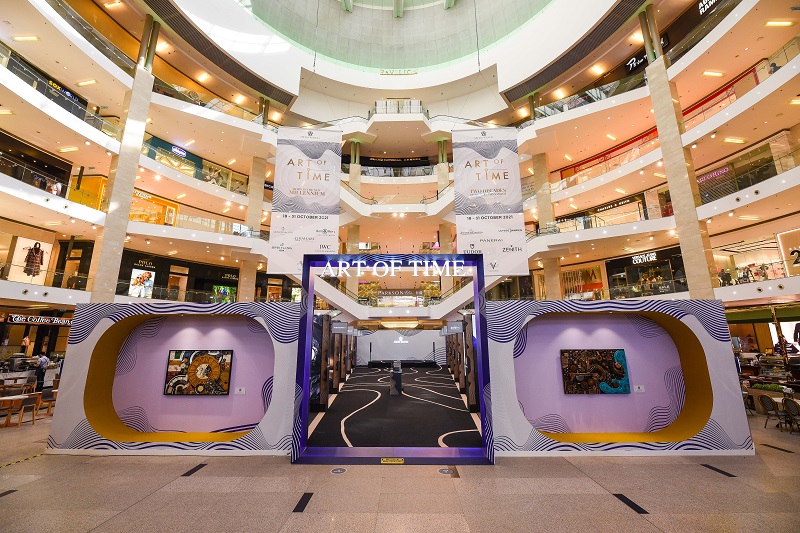
Pulling through a pandemic
In the months prior to the pandemic, Valiram — and retail, in general — was enjoying some of its best times in recent years. “2019 was a stellar [year], and the first quarter of 2020 continued with the same momentum even though there were rumblings of what was happening in China. I’m not one to cry and whine. While I can’t say things were excellent in 2020, they were good. Retail was buoyant in all our markets until the lockdowns happened,” Sharan says.
The pivot was quick. As the pandemic raged, Valiram ventured into e-commerce with the launch of multi-brand e-store Valiram247.com as well as dedicated sites for some of its smaller labels such as Bath & Body Works and Steve Madden. Meanwhile, its Chat & Shop service connected directly with consumers, putting new products and interesting releases on their radar when seeing them in person in the boutiques was not an option. “Our businesses didn’t suffer; they changed. Their shape changed, and sales came to us in different ways. And they came every month of the lockdown,” Sharan states clearly.
When asked what people bought a lot more of during the pandemic, he provides this fascinating anecdote. “The day before lockdown in KL last March, we sold a tremendous number of shoes,” he marvels. “Why on earth, on March 17, did we sell so many pairs of shoes on the day before a lockdown when no one was supposed to even be out? Our customers bought items across the board, like handbags, watches, luggage and other things we sell, but most expeditiously, shoes.”
It would seem that throughout the lockdown, Valiram’s products continued to sell, albeit not in stores — and this applied to the watches, too. “People want what they want,” Ashvin observes. “Our marketing department has put our products on different platforms and the avenues to reach the consumer have grown exponentially. They have more choices than ever before and, under lockdown, the time to discover new things and find stuff they never knew they needed. There are many more younger buyers who read more and therefore have knowledge far greater than we did at their age. They have an immense appreciation for fine craftsmanship and luxury, and brands have also done a far better job of explaining it.”
Sharan chimes in with this interesting fact. “The world’s supply of money has grown — up to 40% more in 2020, and it’s a similar number in 2021. While there are many stories of people in dire straits owing to Covid-19, many others did not suffer, did not have to endure pay cuts — they didn’t spend money going out or heading to work. Pent-up demand is the wrong term. It’s retail therapy that people use to cope.”
art_of_time_1.jpg
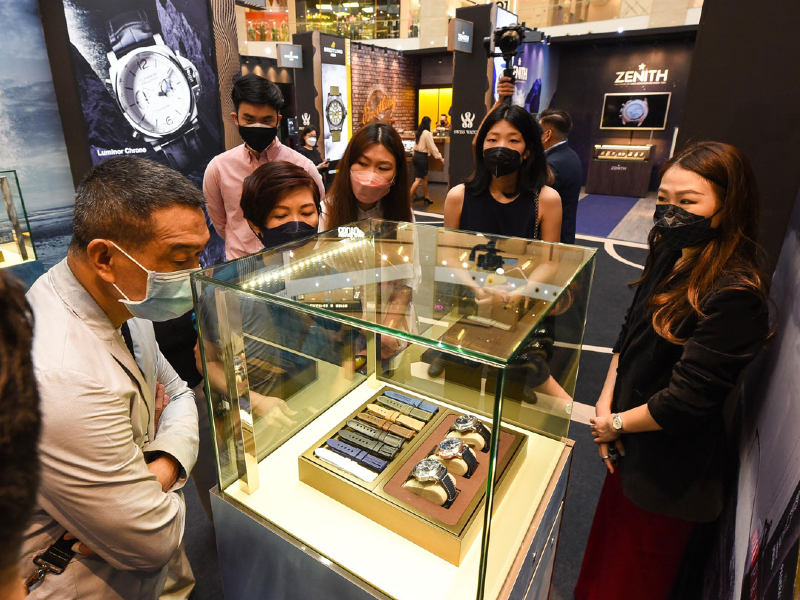
There were technological changes, too. “We had to learn how to use Zoom pretty quickly, followed by Microsoft Teams, and make sure everyone else could use them too,” Ashvin quips. The pandemic proved to be the ideal opportunity for Valiram to upgrade its digital capabilities, enhancing the omni-channel and e-commerce retail experiences as well as creating better connections between all the members of staff in its various markets.
“From a retail perspective, the priority was reaching our consumers quickly and effectively,” Sharan adds. “It was about making sure when they clicked on the buy button, they got what they paid for within the day — that’s the standard we were held up to. Our teams had to learn that if they were selling a watch or something luxurious, they had to get it to our customers quickly. With personal care items, customers are more forgiving and accepting if the delivery takes longer, but for purchases of high-value items, they want it very fast. Another thing they want, despite the pandemic and lockdowns, is concierge service — retail associates actually delivering items to their door.”
The strength of a retailer is defined by its frontliners and so, Sharan and Ashvin made sure to put their well-being front and centre when news of the lockdown broke last year. They advanced everyone’s salaries, personally communicated with the team — which then numbered almost 5,000 in all markets — every two to three days to provide the necessary reassurances, and all employees who contracted Covid-19 were supported financially and emotionally without question and hesitation.
In June, when the lifting of the lockdown was still a distant prospect, Valiram launched a nationwide internal Foodbank Campaign called VCare in aid of staff members who were badly affected. This peer-to-peer initiative organised by and for Valiram employees saw those who could afford it donating any amount they wished towards the cause, which the company then matched dollar for dollar. The funds were used to purchase essential food items, which were sent to staff in need on a weekly basis. A confidential system was set up in the organisation for those who raised their hands for help. The programme evolved as the lockdowns eased, with care packs provided for retail staff as shops reopened, and the next phase will benefit a community centre in the form of food items.
The lockdowns were not easy, but it offered Valiram the chance to dig deep and redefine its identity as a conscientious corporate citizen. It also required Sharan, Ashvin and Mukesh to think about what it meant to be agile, innovative and relevant in today’s retail scene. Valiram’s digital pivot is nothing groundbreaking; today, that is an essential part of any business. When one speaks of change in the context of a company like Valiram, it is about a change in perspective and recognising its role in the nation’s entrepreneurial landscape.
swiss_watch.jpg
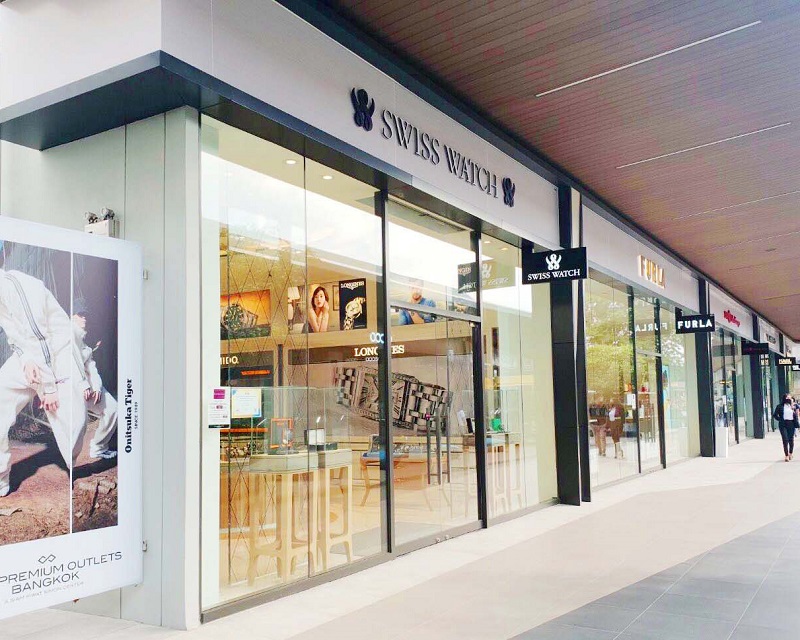
A celebration of time
Valiram, which turns 25 this year, has come this far thanks to pure, old-fashioned hard work. But the story of Swiss Watch’s founding — it was rebranded from Swiss Watch Gallery (SWG) earlier this year — was, by Ashvin’s own admission, an accident. Based on the success of two retail stores in Subang Airport, Selangor, and the Kuala Lumpur International Airport, the company was asked in 2000 to tender for a fashion and watch licence for the newly renovated Penang International Airport. Taking heed of Sir Richard Branson’s famous words of wisdom, they said yes first and then figured out how it should be done.
“When we were awarded the licence, we immediately called our watch principals with all these questions: ‘Please explain to us the business, how it is structured and who we should buy from’,” Ashvin told us in 2016. “One watch group talked to the other, and they were all surprised — who were these Indian fellows trying to get into a business typically dominated by the Chinese, and had no clue about it? We slowly persuaded them that we were for real and we were going to make this work. We managed to grow the business against all odds. Like a dog with a bone, we were intent on learning everything — and that’s how we got everything going.”
SWG opened its doors for the first time on April 4, 2001, representing a healthy assortment of 16 brands. Starting from zero had its benefits — the brothers approached the business very differently from the way others were doing it at the time, and this included an interesting and diverse mix of product offerings. Valiram subsequently opened a second SWG boutique in KLIA in 2002, followed by Pavilion KL in 2008, as well as ventured into standalone specialist boutiques with Rolex, IWC Schaffhausen and Panerai. Outside of the country, it has established a foothold in Singapore and Bangkok with its specialist timepiece emporium. From 16 brands, it now stocks more than 50.
It was in celebration of SWG’s 10th anniversary that Art of Time was first launched in 2011 — an open invitation for fans of watchmaking to discover its many wonders, bringing together the best names in the industry and celebrating the art and heart that drive it. In pre-pandemic times, these events would draw KL’s most fashionable as they came together to celebrate beautiful watches, good champagne and some solid entertainment — after all, the Valirams certainly know how to throw a party worth writing home about. At the individual brand booths, a multitude of activities provided visitors with engaging experiences and compelling promotions to acquire a new watch. More often than not, it worked.
The initial plan was to organise something on a large scale to celebrate Swiss Watch’s 20th anniversary in April, but the pandemic put paid to the proposal — daily new Covid-19 cases were on a steep upward trajectory and the country was under various stages of lockdown. “Our plans were pretty big. It’s taken us 20 years to build a dominant watch business that covers Sabah, Sarawak, north and south of the peninsula, airports and so on. We wanted to organise something befitting, something we could share with all our customers. But because of the pandemic, we couldn’t. Even the exhibition we are having — it was put together in record time as we kept a close watch on the situation in the Klang Valley. Thankfully, the timing has proved to be right.”
211019_aot-35.jpg
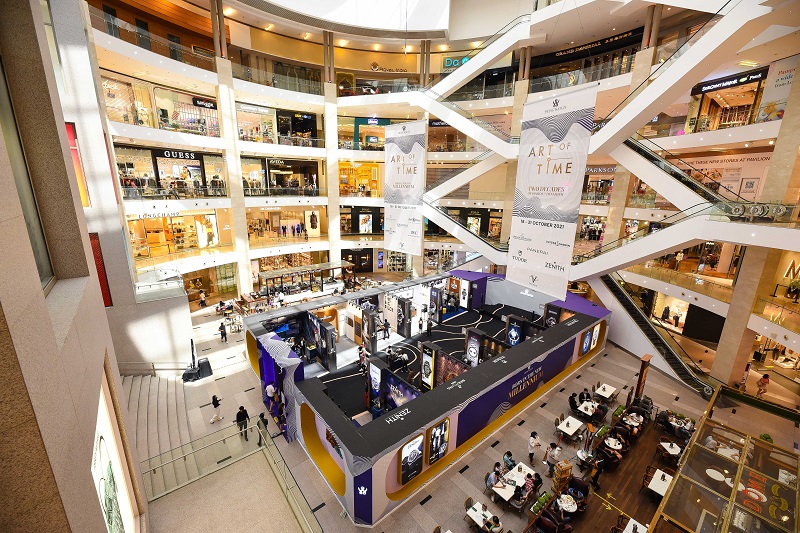
The 4,273 sq ft Art of Time exhibition space draws inspiration from the picturesque Piazza del Campidoglio in Rome, Italy, which utilises clever illusions in perspective and perception to make the space bordered by three buildings appear to be perfectly synchronised. Valiram’s design team adapted this concept to create a welcoming and secure space for visitors to engage in conversation, sit in on talks and participate in workshops. Each booth is also cleverly designed to have equal space without being exactly the same in width and length. Local artists Anniketyni Madian and Nor Tijan Firdaus have each created unique art pieces for the exhibition inspired by its theme, Time is An Illusion.
“Being the leading luxury watch retailer in the country and one that is locally owned, we feel that the responsibility to do something like this is ours,” Ashvin says thoughtfully. “We do it at great expense to ourselves, too! This is not something we make money from. We are doing some very heavy lifting to build a watch appreciation culture in our country. The pandemic has slowed things down, of course, but we didn’t want to give up on this bastion that we have spent 10 years building.”
What about the big plans that Valiram initially had in mind for the anniversary? “I don’t think anything is being scaled back. It has simply been deferred to a more appropriate time,” Sharan says matter-of-factly. “We aren’t ones to scale back; we always think big and outside the box. So, the timing may have changed, but everything we have in mind WILL happen. We will never stop celebrating.”
Indeed, there is much to celebrate — right from when the Penang International Airport space was awarded to Valiram in 2000 to getting the concession in Singapore Changi Airport, the multiple boutique openings in malls across Malaysia and Swiss Watch’s gorgeous space in Resorts World Sentosa, which is a comprehensive showcase of what the company is truly capable of in the highly competitive space of watch retail. Like how engineers of a Formula One car map its strategy for the rest of the race during the straight stretches of the circuit, Sharan, Ashvin and Mukesh have quietly been working on Swiss Watch’s future developments during the lockdowns — the next major milestone for Swiss Watch is an expansion of the business in KLIA, scheduled for completion in 2023.
The future looks bright indeed — it is now up to the family to protect it.
Future-proofed for success
Twenty-five isn’t very old, so it is surprising to know that the brothers started developing a succession plan for the company back in 2005. Learning from the mistakes made by so many other family-run businesses that had let internal squabbles and politics bring them down, Sharan, Ashvin and Mukesh proactively ensured their company would not suffer the same fate. It was in a New York City hotel that the discussions on future-proofing the business began.
“We felt, to be a unified force as a family, we needed to have outside management as a succession plan. Any one of us could get hit by a bus at any time and not be around. We’ve already been affected by the adversity of death with my brother’s [Naresh] untimely passing — he was an astute businessman who held a lot of things close to his heart, which we had to uncover much of after his passing,” Sharan says.
Asian families are not often predisposed to discussing the possibility of death, so this is deeply forward-thinking. It is also one that puts the interests of the company’s staff ahead of commercial concerns — when a well-managed company changes owners, it will not affect the livelihoods of the people it employs. Touchingly, this move by the three brothers also considered their ageing parents, who consider all their sons equal — should the unthinkable happen to any of the Valiram scions, remaining family members would not have to make difficult decisions while dealing with such a painful loss.
Part of their succession planning was also driven by the trends of the time. In the first decade of this millennium, many companies were being bought out for amounts several times their worth. Although it was never in the brothers’ plans to sell Valiram, it did make them think about making the business so streamlined that if push came to shove, the entire process would be quick and painless. As the years passed, their succession plan moved from version 1.0 to 3.0, as Sharan laughingly puts it, and a clear message was conveyed to the brothers’ children: If they wanted to work for the company, they would have to start at the bottom and not “sit in an ivory tower making decisions before you are ready”.
While it is gratifying to know that these plans are in the works, the brothers have no intention of leaving their jobs just yet. After all, they seem to be pretty good at it — not only have they adapted and changed the business they inherited into something relevant and profitable for a new generation, they have remained caring corporate citizens and continue to push the agenda of a wholly Malaysian family-owned business with international aspirations. They are ambitious, driven and passionate, and the following years will likely be their most interesting and successful yet.
This article first appeared on Oct 25, 2021 in The Edge Malaysia.


